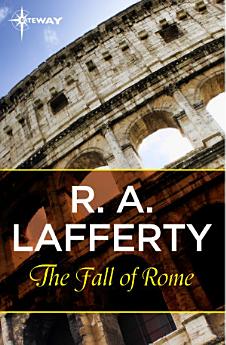The Fall of Rome
জানু ২০১৭ · Hachette UK
ই-বুক
320
পৃষ্ঠা
family_home
উপযুক্ত
info
reportরেটিং ও রিভিউ যাচাই করা হয়নি আরও জানুন
এই ই-বুকের বিষয়ে
The fall of the Roman Empire was the denouement of a long and dramatic confrontation between powerful ideological forces and legendary men. R. A. Lafferty captures the true meaning of both, and examines the people, places, ideas and feelings that led to this epic struggle.
Rome's demise was not a simple case of fierce barbarians sacking and subduing a decadent, crumbling city. The author has skillfully balanced the turmoil and illusions of a mighty, dying Empire against the vitality of the aggressive Huns, Vandals, and above all, the Goths. The result is one of the most perceptive and stimulating historical accounts ever written.
This is history told and read for sheer pleasure: exciting, splendid and complex. The Fall of Rome is a story of the men and women who made things happen, who were as awesome, poignant, and in some cases, as savage as the era itself.
Rome's demise was not a simple case of fierce barbarians sacking and subduing a decadent, crumbling city. The author has skillfully balanced the turmoil and illusions of a mighty, dying Empire against the vitality of the aggressive Huns, Vandals, and above all, the Goths. The result is one of the most perceptive and stimulating historical accounts ever written.
This is history told and read for sheer pleasure: exciting, splendid and complex. The Fall of Rome is a story of the men and women who made things happen, who were as awesome, poignant, and in some cases, as savage as the era itself.
লেখক সম্পর্কে
R. A. Lafferty (1914-2002)
Raphael Aloysius Lafferty was an American science fiction and fantasy writer born in Neola, Iowa. His first publication of genre interest was 'Day of the Glacier' with Science Fiction Stories in January 1960, although he continued to work in the electrical business until retiring to write full-time in 1970. Over the course of his writing career, Lafferty wrote thirty-two novels and more than two hundred short stories and he was known for his original use of language, metaphor and narrative structure.
ই-বুকে রেটিং দিন
আপনার মতামত জানান।
পঠন তথ্য
স্মার্টফোন এবং ট্যাবলেট
Android এবং iPad/iPhone এর জন্য Google Play বই অ্যাপ ইনস্টল করুন। এটি আপনার অ্যাকাউন্টের সাথে অটোমেটিক সিঙ্ক হয় ও আপনি অনলাইন বা অফলাইন যাই থাকুন না কেন আপনাকে পড়তে দেয়।
ল্যাপটপ ও কম্পিউটার
Google Play থেকে কেনা অডিওবুক আপনি কম্পিউটারের ওয়েব ব্রাউজারে শুনতে পারেন।
eReader এবং অন্যান্য ডিভাইস
Kobo eReaders-এর মতো e-ink ডিভাইসে পড়তে, আপনাকে একটি ফাইল ডাউনলোড ও আপনার ডিভাইসে ট্রান্সফার করতে হবে। ব্যবহারকারীর উদ্দেশ্যে তৈরি সহায়তা কেন্দ্রতে দেওয়া নির্দেশাবলী অনুসরণ করে যেসব eReader-এ ফাইল পড়া যাবে সেখানে ট্রান্সফার করুন।







